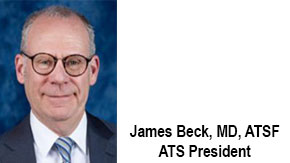Governmental policies have a major impact on patient health, and I’m very proud of the robust advocacy activity  that ATS conducts at a national level. Our advocacy efforts allow our members to contribute to the decision-making process as both experts and, in the case of patient impact, eyewitnesses. ATS advocacy ranges from advocating for funding for federal agencies like the CDC, to addressing health care policy in the U.S., to advocating for tobacco regulation and environmental policy.
that ATS conducts at a national level. Our advocacy efforts allow our members to contribute to the decision-making process as both experts and, in the case of patient impact, eyewitnesses. ATS advocacy ranges from advocating for funding for federal agencies like the CDC, to addressing health care policy in the U.S., to advocating for tobacco regulation and environmental policy.
Given increasingly frequent and intense weather events such as hurricanes, wild-fires, heat waves, floods, and droughts, as well as their associated health consequences, it is no surprise that the ATS, along with our partners in the medical and public health community, have been at the forefront of the climate change fight to urge Congress and the White House to take immediate action.
In 2008, the ATS took its first steps in helping to raise physician awareness that climate change is a health issue. We published an editorial in the ATS blue journal, and also publicly commented in support of the Environmental Protection Agency “endangerment finding,” a necessary first step toward allowing the EPA to use its regulatory authority to regulate climate emissions.
The same year, the ATS also sponsored a resolution at the American Medical Association House of Delegates meeting, which put the AMA on the record in support of findings of the Fourth Intergovernmental Panel on Climate Change (IPCC) report. This was the first time the AMA House of Delegates took a position on climate change, and there was significant dissent from several delegates who opposed the resolution, rejecting climate change as a health issue and rejecting the role of anthropogenic emissions in driving climate change. Ultimately, however, the AMA “[concurred] with the scientific consensus that the Earth is undergoing adverse global climate change and that anthropogenic contributions are significant.”
In the 12 years since, the ATS has continued to advocate and publish, alone and with partners, on climate change and its contributing factors. Such publications include An Official American Thoracic Society Workshop Report: Climate Change and Human Health in 2012; The Sentinel Event of Climate Change: Hurricane Sandy and Its Consequences for Pulmonary and Critical Care Medicine, in 2013; as well as Climate Change. A Global Threat to Cardiopulmonary Health in 2014. In 2014, the ATS also submitted public comments in support of EPA Clean Power Plan. Last year, in conjunction with the Forum of International Respiratory Societies, we published a report on the dramatic health benefits seen in a variety of case studies following reductions in air pollution.
Most recently, ATS environmental advocacy has also included working in the courts, and directly commenting on regulatory issues. In 2016, we filed an amicus brief in support EPA’s authority to regulate carbon emissions in the case West Virginia v. EPA. When, in 2018, the current Administration proposed the EPA Affordable Clean Energy rule, we submitted comments in opposition, just as we did in 2019 when the EPA proposed to rescind rules to reduce methane emissions from oil and natural gas extraction sites. Currently, the ATS is working in support of state and environmental groups who are challenging the proposed EPA Affordable Clean Energy rule.
In the midst of our work on climate change within governmental bodies, we have also reflected on our own responsibilities as a Society. In 2015 and 2016, we surveyed our membership, domestic and international, respectively, for their attitudes on climate change, and published the results. We’ve reviewed the annual ATS International Conference to find ways to lessen the environmental impact, and among other changes, have eliminated single use water bottles, reduced paper waste, and are excited to offer a carbon offset option for attendees, new this year.
Looking forward, the ATS will continue to review and comment on EPA regulations that impact greenhouse gas emissions, publish manuscripts that document the adverse health effects of climate change on respiratory health, and work with sister organizations to support the adoption and implementation of policy to reduce greenhouse gas emissions and remediate the current/anticipated future impacts of global climate change.
We hope you will join us in working for a cleaner, and cooler, planet.

